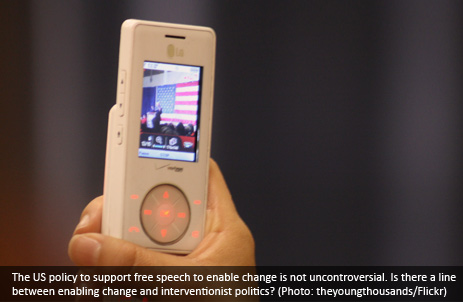In an article in the New York Times, the Internet guru Clay Shirky commented on the US State Department policy of supporting free speech and open networks and their lack of a policy aimed at destabilizing autocratic governments. It is, he says, the same thing. For once, I disagree with him. From a practical point-of-view (and given time) he is right. But from a policy perspective, there’s a huge difference.
I believe promoting universal ideals and values is better than supporting subversive organizations. I have a few reasons for this.
Reason I: Freedom of speech is not an end, but a mean.
I think most proponents of an open society would agree. The end is the open society itself: the democracy; the freedom; the opportunity for all to lead the lives they choose. Despite all its flaws, the most universal agreement we have on the issue is the Declaration of Human Rights.
Reason II: No One Path
No democracies–neither in the western nor global world–share the same history. There are radical differences to how democracy came about in Sweden and France for example. Both these two countries where once monarchies with a king who held absolute power. The method used to dismantle authoritarianism ranged from revolutions to reforms, but regardless of which path they took, democracy was an effect of increased demands from its people. Not the other way around.
Reason III: They might not want your help
What’s important is that whatever method people use to achieve democracy, is their method. Their way. Reading bloggers from the Middle East, it becomes apparent that there are inherent issues with being associated with technology that can be labeled in the service of foreign interests. (I have expanded on my views on this in an earlier post.)
Reason IV: The Neutral Network
One of the reasons that the Internet is a very good tool for promoting change is because the technology itself is apolitical. The inherent openness of the network is a major reason it got allowed into the repressive states to begin with.
In a parallel universe, where closed services like AOL prevailed over the open Internet, do you think Iran would have let it inside its borders? I doubt it. Even less so if it was not operated by AOL but by the CIA. And, even-even less so if the CIA operated it under with the express intention of bringing the Iranian state down.
Reason V: Outflanking Them
I believe that, in the long run, openness and transparency will prevail. I believe that once people can exchange ideas freely, the modes of the state will have to change. But it’s not primarily the US Government, or any other foreign entity, who should be the instigator of change. They can provide the tools, but should do so with care. The people will do the rest. In due time, perhaps. But they will.

